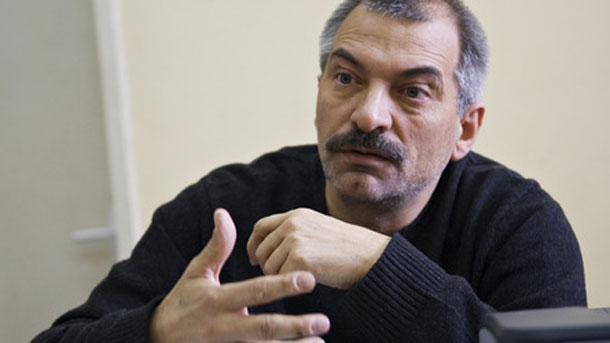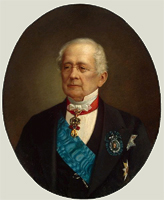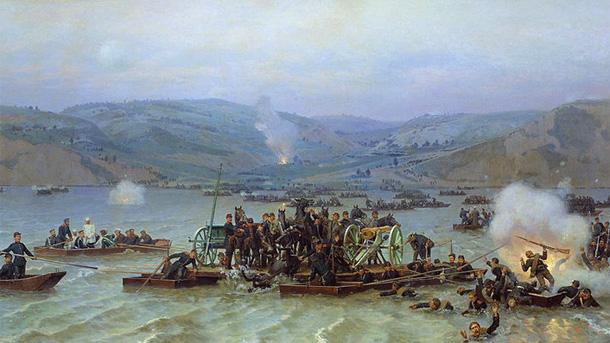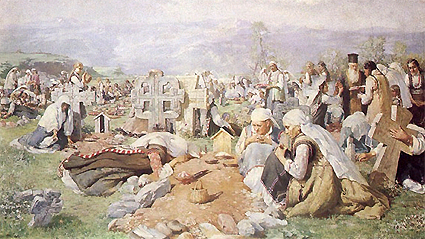Today Bulgaria marks its national day. A peace treaty was signed in San Stefano on March 3, 136 years ago putting an end to the Russo-Turkish war of 1877-1878. After almost five centuries of Ottoman domination, new vistas opened up before our ancestors: of restoring Bulgarian statehood, of a European development for the country. The liberation was preceded by a widespread revolutionary enthusiasm across the Ottoman Empire. In 1875 an uprising broke out in Bosnia Herzegovina. A year later came the April uprising in Bulgaria. Some of its leaders were hoping it would succeed, others wanted to attract the attention of the Great Powers in the hope that they would intervene for a resolution of the Balkan issue. The uprising was drowned in blood and its brutal suppression reverberated across Europe.
 “The April uprising marked the apex of the Bulgarian national liberation movement. It played a key role in deepening the so-called Eastern crisis,” says in an interview for Radio Bulgaria Prof. Dr. Plamen Mitev, head of the History department at the St. Kliment Ohridski University in Sofia. “In the light of this crisis it brought about a gradual change in the policy of the Great Powers with regard to the Ottoman Empire. To begin with a diplomatic conference was called in Istanbul for finding a peaceful settlement to the arising conflicts in the Balkans. After its failure however a military solution to the Eastern crisis was sought. An important role in this respect was played by the international repercussions of the events in the Bulgarian lands in the spring of 1876, and it was these repercussions that radically altered the way civil society across Europe regarded these events. Public opinion exerted an enormous amount of pressure on the governments of the Great Powers and they gradually realized they had to alter their conduct with regard to the events, connected with the Eastern crisis.”
“The April uprising marked the apex of the Bulgarian national liberation movement. It played a key role in deepening the so-called Eastern crisis,” says in an interview for Radio Bulgaria Prof. Dr. Plamen Mitev, head of the History department at the St. Kliment Ohridski University in Sofia. “In the light of this crisis it brought about a gradual change in the policy of the Great Powers with regard to the Ottoman Empire. To begin with a diplomatic conference was called in Istanbul for finding a peaceful settlement to the arising conflicts in the Balkans. After its failure however a military solution to the Eastern crisis was sought. An important role in this respect was played by the international repercussions of the events in the Bulgarian lands in the spring of 1876, and it was these repercussions that radically altered the way civil society across Europe regarded these events. Public opinion exerted an enormous amount of pressure on the governments of the Great Powers and they gradually realized they had to alter their conduct with regard to the events, connected with the Eastern crisis.”
As to the Eastern crisis itself, it should be viewed in a context broader than the Balkans, Prof. Mitev notes. It affected many more aspects connected with the Ottoman Empire which encompassed territories of strategic importance to the Great Powers in the Middle East and Central Asia. Great Britain was firmly for a preservation of the status quo, even in the light of the uprisings in Bosnia Herzegovina and in the Bulgarian lands. France and Italy’s positions were more moderate, inasmuch as they remained in the wings of the big problems in the Balkans. But the speeches by Victor Hugo in parliament and the publications in the French press evoked unequivocal support for the suffering Christian population. German chancellor Otto von Bismarck, a deft diplomat, took some delicate steps, leaving others to pick the hot potatoes out of the fire. On the other hand while talking of preserving the status quo, behind the scenes Austria-Hungary was in fact working towards its disruption, inasmuch as its interests were focused on Bosnia Herzegovina. Vienna’s diplomatic moves played an important role in aiding the uprisings in these two rebellious provinces. It also supported the preparations in Monte Negro and Serbia for a future war against Turkey. These behind-the-scene maneuvers on the part of Austria-Hungary played a crucial role in shaping the conduct of Russia. Having been defeated in the Crimean war (1853-1856) it was obliged to strictly abide by the clauses of the 1856 Paris peace treaty. That was why Russian diplomacy was very cautious in its attempts at defending its interests in the Balkans without provoking a European reaction.
 “Prince Gorchakov, then head of Russian diplomacy, had to demonstrate that the country was keeping its distance from the military operations in the Balkans on the one hand,” Prof. Mitev explains. “But on the other the military lobby, the emperor himself were looking for possible ways to get their revenge after the disaster of the Crimean war. In this sense, Russia’s policy towards the Bulgarians and the Eastern crisis seems controversial. Yet, if we take a look behind the scenes of this controversy, we shall see that there is logic here – constantly looking for a way to deal a blow on the dictate of the Paris peace treaty on the one hand and on the other – a constant aspiration to aid the liberation struggles of the Balkan peoples.”
“Prince Gorchakov, then head of Russian diplomacy, had to demonstrate that the country was keeping its distance from the military operations in the Balkans on the one hand,” Prof. Mitev explains. “But on the other the military lobby, the emperor himself were looking for possible ways to get their revenge after the disaster of the Crimean war. In this sense, Russia’s policy towards the Bulgarians and the Eastern crisis seems controversial. Yet, if we take a look behind the scenes of this controversy, we shall see that there is logic here – constantly looking for a way to deal a blow on the dictate of the Paris peace treaty on the one hand and on the other – a constant aspiration to aid the liberation struggles of the Balkan peoples.”
On April 12 (24 according to the new calendar) 1877, Russian Emperor Alexander II declared war on the Ottoman Empire. The enemy was more numerous, better armed and better prepared for war. As the war progressed, there were critical times such as the battles at Stara Zagora, at the Shipka pass, the siege of Pleven and the difficult winter passage across the Balkan Range. It was at these times that the Russian army demonstrated unparalleled tenacity and heroism. And in truth, what proved crucial in this war was the just cause. The Russians and the people of other nationalities in the liberation army gave their heart and their soul to the war effort. But the active help of the Bulgarian population also played a major role. “Talking about the role of the Bulgarian population during the war, we usually focus on the efforts of the voluntary troops which are undoubtedly crucial – as is the case during the battle at Shipka.”
 “But besides the volunteer corps, Bulgaria’s involvement in the war spread to other spheres as well,” Plamen Mitev goes on to say. “The role played by the Bulgarians with reconnaissance missions was crucial – there existed a reconnaissance network working at the rear of the Turkish army. Suffice it to mention how the Turkish command was hoodwinked regarding the specific plan to transfer Russian troops South of the Danube. It staked on the Russian offensive taking place across Eastern Bulgaria, so enormous resources were invested in preparing the four major fortresses Rousse, Silistra, Shoumen and Varna. On the eve of the war of liberation, around 52 percent of the Turkish forces in the Balkans were concentrated there. While on June 15, 1877 the Russian forces secretly forced the Danube at Svishtov. And the Russian command was able to station its units in such a way as to make its preliminary plan of crushing the Turkish army work effectively.”
“But besides the volunteer corps, Bulgaria’s involvement in the war spread to other spheres as well,” Plamen Mitev goes on to say. “The role played by the Bulgarians with reconnaissance missions was crucial – there existed a reconnaissance network working at the rear of the Turkish army. Suffice it to mention how the Turkish command was hoodwinked regarding the specific plan to transfer Russian troops South of the Danube. It staked on the Russian offensive taking place across Eastern Bulgaria, so enormous resources were invested in preparing the four major fortresses Rousse, Silistra, Shoumen and Varna. On the eve of the war of liberation, around 52 percent of the Turkish forces in the Balkans were concentrated there. While on June 15, 1877 the Russian forces secretly forced the Danube at Svishtov. And the Russian command was able to station its units in such a way as to make its preliminary plan of crushing the Turkish army work effectively.”
 Let us add that Bulgarian volunteer groups acted in the rear of the Turkish army. Bulgarians helped the Russians in their passage across the Balkan Range in severe winter conditions. The population also helped with food. “But there is one thing that remains unspoken and unwritten,” Prof. Mitev adds. “And it is the fate of the Bulgarians at the rear of the Turkish army, the price the peaceful population had to pay for this war and their liberation. And I mean the thousands of lives lost to the vengefulness of the Turkish troops and the bashi-bozouk in Southern Bulgaria before the onslaught of the Russian army or in the villages that had fallen into Russian hands but were recaptured by the Turkish army. This enormous price paid by the Bulgarians is something that should go down in the unwritten pages of this war of liberation and which gives us every reason to say we have not been given our freedom on a platter.”
Let us add that Bulgarian volunteer groups acted in the rear of the Turkish army. Bulgarians helped the Russians in their passage across the Balkan Range in severe winter conditions. The population also helped with food. “But there is one thing that remains unspoken and unwritten,” Prof. Mitev adds. “And it is the fate of the Bulgarians at the rear of the Turkish army, the price the peaceful population had to pay for this war and their liberation. And I mean the thousands of lives lost to the vengefulness of the Turkish troops and the bashi-bozouk in Southern Bulgaria before the onslaught of the Russian army or in the villages that had fallen into Russian hands but were recaptured by the Turkish army. This enormous price paid by the Bulgarians is something that should go down in the unwritten pages of this war of liberation and which gives us every reason to say we have not been given our freedom on a platter.”
Liberation Day is a day when we pay homage to the soldiers from the Russian army – both Russian and of other nationalities, as well as the Bulgarians who laid down their lives for the independence of Bulgaria. The country is studded with numerous monuments to all those who died in the war. But March 3 is also a day of optimism because it is the day when Bulgaria was resurrected to a new life and in just a few decades turned into a civilized country with a well developed economy and culture.
English version: Milena Daynova
"Man does not know the way to heaven, but the horse does," says an ancient Thracian proverb. That is why the Thracian kings were necessarily sent to the afterlife together with their horses. Because of the numerous burial mounds of rulers from the..
An innovative museum site opens its doors in the military cemetery near Tutrakan. The "Tutrakan Epopee - 1916" memorial is situated in a new museum-exhibition building. It includes a number of new technologies that immerse the visitor..
The last and most destructive bombing of Sofia during World War II took place on April 17, 80 years ago. In 1944, on April 17 at noon, 350 American bombers, accompanied by Thunderbolt and Mustang fighters, dropped 2,500 bombs on..
An innovative museum site opens its doors in the military cemetery near Tutrakan. The "Tutrakan Epopee - 1916" memorial is situated in..
"Man does not know the way to heaven, but the horse does," says an ancient Thracian proverb. That is why the Thracian kings were necessarily sent to the..

+359 2 9336 661
